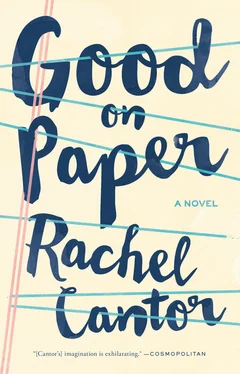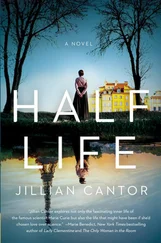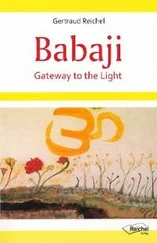I considered getting a chocolate bomb, decided against it. Instead I left my belongings on the table, and ran across to the Love Drugstore to get a hard-backed notebook.
Door Number Two: Notes for a New Life , is what I wrote on its cover. And on page one: “The Call.” Then I shut the notebook and began to read.
•
The first thing we learn about Romei in “The Call” is that he’s blocked: he can’t write. He’s wandering through Rome, regretting the emptiness of his mind, the impermanence of his income, when he sees, is struck out of his self-absorption by, Esther in the park. She sucks delicately on a finger, is absorbed in a notebook, the sun streams down onto her bobbed brown hair.
Romei suffers often from unrequited love: there are women all over Rome with whom he cannot bring himself to speak. In Esther, however, he senses a weakness ( una debolezza ) that makes it possible for him to approach, a helpless carnality, a vulnerability that finds expression in tentative gestures, a tendency to put hands to face. He stands over her, blocking the sun (rather as, in my story, Paul Celan stood over my young protagonist Rose). Gold shines from her bright brown eyes.
What are you writing? he asks, in English.
A translation, she replies. Song of Songs , in her spare time, something in rather short supply (she gestures toward a child flying circles in the grass). Her expressions are particular, unforgettable. She has few perfections, yet somehow her parts — her fleshy nose and thick ankles, her sweater set (a Beatrice-inflected crimson), her chewed fingernails and readiness to satisfy his curiosity — add up to a compelling whole. Modest, yet direct; anxious, yet eager to please; decorous, yet wanton.
Why does she do this? Romei wants to know.
It’s the only thing she knows how to do, she says, as if apologizing.
Why the Song of Songs ?
Because it’s the greatest love poem ever written, she says. Mutual, mysterious. Embodied and erotic, suggestive of a most spiritual communion ( comunione , with all its religious undertones).
I don’t remember that, he says. In fact, he’s never read the Song . The priests of his childhood forgot to mention it, and as an adult he finds himself drawn to classical and medieval verse. Esther intuits his ignorance, “reminding” him that the Song concerns the innocent, impassioned love of a man and a woman.
Here, she says, placing pages on her knee, I’ll show you. You read the part of the boy. I’ll read the part of the girl.
He stands there stupidly.
I have not guarded my vineyard, she says.
He sits down quickly, close enough to read, approaching her “threshold,” or so he says.
My dove, hiding in the shadow of the rock , he replies. Let me see the sight of you, for your voice entices me. You are lovely to behold .
They continue, “the lover, the king” and his “sister-bride,” sitting ever closer on their bench, becoming drunk on poetry, seduced, the narrator says, much as Paolo and Francesca, swirling in the winds of Dante’s Inferno , were seduced by tales of adultery.
Pretty story, the child murmurs, falling asleep at their feet.
One imagines one knows what will happen next: Romei will cross Esther’s threshold — but in fact, we don’t know: this was all he’d sent.
•
I returned home, presents in hand, to find Ahmad reading a fat Indian novel on the couch, Andi leaning into him, reading a Nancy Drew. I was reminded, not for the first time, of their resemblance — not just their brown skin and shiny black hair, but their bright, smart eyes, their quick features and watchful expressions. I smiled, remembering how Aunt Emma, my father’s sister, had listened to the story of how I’d met Andi’s father in Delhi, looked back and forth between Andi and Ahmad, as if to say, You can’t kid a kidder.
My family, my beautiful family!
Ahmad’s sons thought him a monster, or so he’d been told — he wasn’t allowed to see them, not that he went back to Pakistan much. When the youngest is eighteen, he said vaguely, he’d get in touch. They’d understand: a parent never stops loving his child.
Until that time, I thought, he has us. He’ll always have us.
You saved me, he said more than once. You saved me , was my standard reply, taking us in when I was pregnant — but it was more than that.
My father and I had waited for my mother at the airport, ready to return home after our first sabbatical in Rome. She must have been delayed, he said, white-faced. We’ll get on the plane, she’ll be on the next one for sure. At Kennedy, a light snow falling, we met the next flight, and the next.
I’d thought all losses permanent till Ahmad came back into my life.
I walked up behind him and kissed the top of his head.
Thank you, I whispered. Thank you.

It was raining the next morning when I took Romei’s pages back to Cuppa Joe’s and read them again, this time as a translator.
I’d once loved translation, before I got all complicated about it. Weighing poetic elements, deciding which to highlight, which to sacrifice — because not everything can survive translation. The eleven-syllable Italian line doesn’t transfer easily to our English pentameter: you’d think it would exceed the capacity of our ten-syllable line but, being syllable rich, Italian condenses at the rate of four English feet per line. What’s a translator to do? Preserve the length of the original line by padding the translation? Sacrifice meter for concision, semantic accuracy, the original line breaks? It’s something of a lose-lose situation. Hence the age-old notion that she who translates is both translator and traitor: traduttore e traditore .
Over my computer I’ve taped a quote from Nabokov, who knew something of the chasm between languages, and strongly preferred the “literal” to the “literary”: “I want translations with copious footnotes,” he wrote, “footnotes reaching up like skyscrapers to the top of this or that page so as to leave only the gleam of one textual line between commentary and eternity. I want such footnotes and the absolutely literal sense, with no emasculation and no padding — I want such sense and such notes for all the poetry in other tongues that still languishes in ‘poetical’ versions, begrimed and beslimed by rhyme.”
Indeed!
At Joe’s, I identified two questions I’d need to think about. First, Romei’s Song of Songs fragments: had he played with the original? I had no idea. I’d have to consult some English Bible translations. Then there was the matter of Romei’s first poem. If Dante’s first poem describes a dream (in which Love feeds Dante’s heart to Beatrice), Romei’s describes a wet dream: his inkless pen, refilled by Esther, explodes onto the page in the form of a self-fulfilling prophecy (a sonnet about an inkless pen refilled, exploding). I’d have to check, but I was sure it had been fashioned out of fragments of Romei’s earlier work, recast here out of context as something new.
His “pen,” for example (his penna , or quill ) was free-floating in the earlier poems, never associated with anything other than itself ( penna qua penna ); now it resonated: it meant pen, but also wing , the poet’s words, the uomo di penna (the man of letters), even the poet himself, as in Italian, penna can be a figure for writer. Penna, penna, penna . Dante’s birds fly with plural wings ( penne ), but in Romei, one might well ask: What is the sound of one penna flying — maybe the sound of Icarus spennar (defeathered) and falling?
Читать дальше













